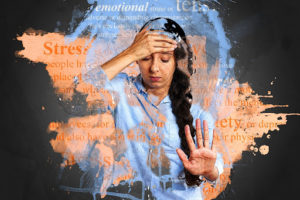Many people who experience traumatic events often have to deal with the effects for prolonged periods. In some cases, the effects are so debilitating and persistent that they constitute an illness known as post-traumatic stress disorder (PTSD). Do you think you or your loved one may have PTSD? In this article, you’ll learn about the main PTSD symptoms and what to do about them. Let’s get to it!

PTSD Meaning
What is the meaning of PTSD, and does it have a cure? PTSD is a mental health disorder that some people suffer from due to a terrible ordeal that they experienced. These traumatic events vary from life-threatening situations such as combat, natural disasters, or sexual assault to non-life-threatening events like the unexpected death of a loved one.
Generally, PTSD evokes feelings of fear and helplessness, sometimes even horror when triggered. This is usually more intense than the usual “fight-or-flight” response that our bodies experience when facing traumatic events. For people with PTSD, the feeling is more severe. It can cause physical changes in the body, such as increased blood pressure, elevated heart rates, and shortness of breath.
What Causes PTSD?
When it comes to post-traumatic stress disorder causes, no one is entirely sure why it develops. We don’t respond to traumatic events the same way since our brains are wired differently. That being said, there are several risk factors that can increase one’s vulnerability to PTSD.
The primary risk factor is the nature of the traumatic event itself — extreme life-threatening events are more likely to cause post-traumatic stress disorder. Intentional harmful situations, such as torture, assault, and rape, are more traumatic than accidents and ‘acts of God’ situations. The more prolonged and severe the threat, the higher the risk of leading to PTSD down the line.
Other risk factors include:
- The unexpectedness and inescapability of the traumatic event
- Previous traumatic experiences, such as a history of physical or sexual abuse
- Family history of depression, anxiety, or related mental disorders
- History of substance abuse
Over time, many people who experience trauma recover naturally. However, people who have PTSD hardly ever find relief. They continue to feel stressed, frightened, and helpless long after the event is over. If you’ve been feeling this way for some time, it’s important to understand how these symptoms manifest so you can manage them better when triggered.
PTSD Symptoms
There are four primary categories of PTSD symptoms– though they may present differently from one individual to the other. Many of these symptoms also overlap, so the victim often feels completely helpless with no hope for reprieve. The good news is there’s always hope on the horizon, and a brighter day awaits with proper treatment.
With that said, here are the four primary PTSD symptoms to know about:

1. Re-living the Experience
This is also known as re-experiencing symptoms. You might experience something that reminds you of the trauma, which causes you to relive that traumatic event and suffer from fear and hopelessness again. For example, a rape victim coming face to face with her abuser can make the victim feel like they’re reliving the traumatic experience all over again.
Symptoms can include vivid flashbacks, intrusive thoughts, nightmares, and difficulty concentrating.
2. Avoidance Symptoms
This is when you close yourself off and try to avoid people or situations that trigger trauma memories. For example, if you nearly drowned or had to witness a loved one drowning and you couldn’t do anything about it, you’ll probably avoid swimming forever.
Another example is in the hit series “Game of Thrones” where Sandor Clegane’ The Hound’ (played by actor Rory McCann) has a deep-seated fear of fire because of the trauma he experienced as a child. Avoidance symptoms can also manifest in avoiding certain thoughts or feelings or even memory loss.
3. Hypervigilance Symptoms
If you’ve experienced a traumatic event, you might enter a state of hypervigilance — increased alertness, insomnia, jitters, and anxiety. While there’s nothing wrong with being vigilant, this state of extreme awareness is both physically and mentally draining.
It can also lead to strong emotions like angry outbursts and general irritability. For example, suppose you’re constantly feeling on edge or having difficulty sleeping. In that case, you might be prone to overreact to minor issues or engage in risky behavior that endangers you and those around you.
4. Cognition and Mood Symptoms
These are negative changes in how you see yourself and the world at large. PTSD can have you feeling hopeless and living with an inability to have positive emotions. You might become distant and isolate yourself and find it difficult to enjoy activities that you once loved.
Another debilitating symptom is seeing yourself in a bad light like somehow you’re not worthy of love or friendship anymore. Some people also go as far as blaming themselves for the traumatic event — “if only I had stayed home”, “if only I wasn’t walking alone,” “if only …” It’s important that you never give in to these feelings. No matter what has happened, you are worthy of healing and success in life.
What is the Treatment for PTSD Stress?
Psychotherapy (one-on-ones and group therapies) and medication are the two main treatments for PTSD. However, like most mental health disorders, the all-important first step to healing is making the decision to get treatment. It’s not uncommon for people with PTSD to live in denial until the situation worsens and results in physical or mental harm.

The actual treatment will depend on a number of factors, including the severity of the disorder and the risk factors that the patient deals with every day. In some cases, just talking about the traumatic event can break the cycle and get you on the path to recovery. The medical professional may also prescribe antidepressants to manage symptoms like anger, anxiety, and perpetual worry. They can also prescribe medication to help with insomnia and nightmares.
Are you suffering from any of the aforementioned PTSD symptoms? Professional help from the experts at Roots Through Recovery is just one call away. Let us help you get over your PTSD today and show you how to manage stress better to manage your triggers and avoid relapses. Call us now at 562-247-3520 or reach us via email at info@roots-recovery.com.



